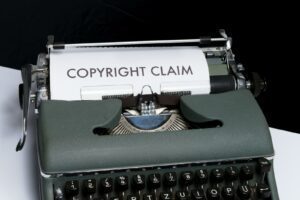Contents
As a wedding videographer, soundtracks are an important part of creating a memorable wedding video for your clients. However, you may be wondering about any copyright issues when using someone else’s music in your work.
It’s a good idea to be informed about any potential legal issues, as this could save you from trouble down the line. Let’s take a closer look at some of the copyright legal considerations for using commercial tracks in a wedding video.
What Does The Law Say About Using A Commercial Track In A Wedding Video?
Let’s start with the main legislation that determines how copyright works in Australia – the Copyright Act 1905 (Copyright Act). The legislation covers a lot of different aspects of copyright law, however it doesn’t explicitly mention the rules around using commercial music in a wedding video. As a result, the law is pretty nuanced when it comes to using music in a wedding video.
It’s best to take your specific scenario into consideration and utilise the correct legal instruments like a Service Agreement to ensure you’ve covered your bases and protected your liabilities. This way, you’ll be in a better position to save your wedding videography business from claims of copyright infringement.
What Are The Rules On Fair Dealing For Private Use?
You might have heard of fair dealing for private use. Essentially, fair dealing refers to the idea that in certain circumstances, it’s okay for someone to use a copyright work (in limited capacity) without the permission of its creator.
However, there’s no official definition of fair dealing in the Copyright Act. Rather, the legislation has listed certain circumstances where the exception of fair dealing is applicable. These exceptions include:
- Research and study purposes
- Review and critique
- News reporting
- Creating a parody or satire
- Under legal circumstances
As you can see, it can be difficult to claim fair dealing for music on a wedding video.
You might be thinking, what’s the big deal, everyone does it right?
It is commonly thought that using commercial tracks in a private, non-commercial context shouldn’t create too much of a fuss. However, this doesn’t mean there isn’t any legal risk attached to it.
Using a wedding video for a limited audience of friends and family is technically permissible, however this is a complex legal area. Using the music for personal reasons is likely to attract legal scrutiny but it does not absolve you from copyright responsibilities.
So, it’s important to understand how each case is different and the legal risks or limitations that may come with it. If you’re confused or have any questions, it’s best to seek expert advice from a legal professional.
Sharing Online And Licensing: Do I Need A Licence To Add Music To A Wedding Video?
If you intend on sharing a wedding video online or in a public setting, then this changes matters substantially. You’ll now be subjecting the video to a much larger audience, so you’ll need to take steps to ensure that you’ve taken the right legal measures.
This means, you’ll need to obtain a licence from the copyright owners of the music. A licence is essentially permission to use that music. When you agree to get a licence to use the work of another person, it will determine in what capacity you can use the music for, the period of the licence and anything else that is important. Make sure you pay attention to these details and work within the boundaries of the licence.
Remember, modern online platforms have sophisticated detection systems that can identify copyrighted music. So, if you haven’t taken the correct legal measures you could risk your video potentially being blocked or removed. Moreover, legal action can be taken against you for copyright infringement. These ramifications can include financial penalties and other legal consequences – it’s best to make sure you’ve fulfilled any legal obligations prior to putting a wedding video containing commercial tracks out there.
Does This Apply For Instrumental Covers To?
Yes, the need for a licence also applies for instrumental covers. Using instrumental covers in your videos still requires careful attention to licensing. Even if an instrumental version is distinct from the original, a synchronisation licence is required for legal use. The risk of detection by automated systems does not negate the legal obligation to obtain this licence. It’s important to handle these covers with the same level of caution as original tracks.
If you’ve got any questions about the next steps you need to take, it’s best to talk to a legal expert to get advice that’s catered to your specific situation.
Are There Any Options On Social Media Platforms For Licenced Music?
Yes, you can do some research to see if a certain social media site has music you might be able to use. Platforms like YouTube, Instagram and TikTok have curated libraries of music with specific licensing agreements.
However, these libraries are limited and do not encompass all music. It’s also vital to verify whether the track you wish to use is included. Once you’ve done this, take a look at the relevant agreement (you should be able to find it online) so you can understand the conditions attached to its use.
These platforms generally cover the use of original recordings, not user-uploaded covers or unlicensed tracks. As a result, it’s important to be aware of any limitations and make sure your actions are in accordance with them.
Reading these agreements can be a bit of a hassle, as there’s often language that’s a bit confusing or legal jargon that is hard to understand. If you have any questions, our legal experts are always happy to help.
What If Something Is Out Of Copyright?
Copyright doesn’t last forever. For most types of work, it lasts for about 70 years. After that, it’s in the public domain. If something is in the public domain and no longer under copyright protection, then you are likely to have less legal barriers around how, when and in what ways you can use it. However, before you start looking for songs that are more than 70 years old, it’s important to be careful.
Understanding whether a piece of music is ‘out of copyright’ is a complex matter. This duration of copyright can be based on multiple factors. Therefore, it is essential to seek expert advice to determine if a work is indeed in the public domain before you utilise it.
Using Alternatives: ‘Soundalikes’ And Royalty-Free Music:
Many videographers opt for ‘soundalikes’ or genuinely royalty-free music. This way, they can navigate their way around licensing complexities. If you want to do this, you’ll need to find soundtracks that resonate with the commercial songs you’re looking for but are free from copyright claims. It’s a creative and legally safe way to align with your client’s preferences.
Next Steps
Given all the risks with using commercial music, it’s important to have a robust Service Agreement in place which protects from liability and makes it clear to your clients how these legal aspects work.
For expert guidance on using commercial tracks in line with copyright laws and ensuring your videos capture memories without inviting legal trouble, feel free to contact us. To summarise what we’ve discussed:
- The Copyright Act in Australia doesn’t explicitly address using commercial music in wedding videos, making legal considerations nuanced
- Fair dealing for private use, although applicable in certain circumstances, is challenging to claim for music in wedding videos
- Sharing videos online or publicly requires obtaining a licence from the copyright owners of the music to avoid legal consequences (even if it’s an instrumental version)
- Some social media platforms offer curated music libraries with specific licensing agreements, but limitations must be verified
- Copyright duration lasts about 70 years, after which a work may be in the public domain, but determining this requires expert advice
- Videographers can opt for “soundalikes” or genuinely royalty-free music to navigate licensing complexities and align with client preferences
- Having a robust Service Agreement is crucial for protecting against liability and clarifying legal aspects for clients
If you would like a consultation on copyright in wedding videography you can reach us at 1800 730 617 or team@sprintlaw.com.au for a free, no-obligations chat.
Get in touch now!
We'll get back to you within 1 business day.












